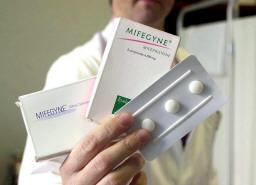Outgoing Health Minister Livia Turco countered growing attacks on Italy's abortion law on Tuesday by issuing figures showing that the number of women resorting to a termination was in steady decline.
Turco told parliament that a total of 127,038 abortions were carried out in 2007 - 3% less than in 2006 and 45.9% less than in 1982 when the number of terminated pregnancies hit a record level (234,801).
The minister said the abortion rate in 2007 was 9.1 per 1,000 women aged 15-49 compared to 9.4 in 2006 and 17.2 in 1982.
But Turco noted that while abortions were falling among Italian women (down 3.7% compared to 2005), they were on the rise among foreign women living in Italy (up 4.5% over 2005).
She said abortions performed on non-Italian women accounted for 31.6% of all abortions carried out in 2006 compared to 10.1% in 1998.
Turco also highlighted a rise in terminations among under-18s, saying the abortion rate for that group had risen from 4.8 per 1,000 in 2005 to 4.9 in 2006.
Late-term abortions (after the 21st week of pregnancy) accounted for 0.7% of all terminations in 2007, she said.
Under Italy's 1978 abortion law, terminations are legal during the first three months of a pregnancy in state hospitals. After that, abortion is legal only when the pregnancy is considered a ''grave danger'' to a mother's life.
A 1981 public referendum bid to overturn the law failed.
The law has come under repeated attack over the past year from the Catholic Church and pro-life groups, and a large number of politicians, particularly on the centre right, have been calling for more restrictive legislation.
Pro-choice associations were alarmed in December when high-profile conservative newspaper editor Giuliano Ferrara, who is close to incoming premier Silvio Berlusconi, launched an appeal for a universal moratorium on abortions.
The idea won the immediate backing of top Catholic Church officials.
Ferrara went on to start up his Abortion? No Thanks movement, running for premier in the April 13-14 election and campaigning on a one-issue, pro-life ticket.
His party fared disastrously, gaining less than 0.5%.
But the pro-life movement has made the introduction of medical or non-surgical abortions difficult in Italy.
Medical abortion involves the use of drugs such as the pill RU486 to end an early pregnancy.
While medical abortions have long been available in many European countries, in Italy they were introduced in 2005 on an experimental basis and only in a small number of regions.
Turco said that since then, a total of 2,353 medical abortions had been carried out in Italy and that six out of Italy's 20 regions had experimented with the procedure.
Meanwhile, pro-choice activists complained that the growing number of pro-life medical practitioners was making it difficult for some women to obtain abortions.
Under Italian law, doctors can refuse to perform an abortion if it runs counter to their principles.
Turco said that 70% of all Italian gynaecologists were now 'conscientious objectors' compared to 58.7% in 2003 while 50.4% of anaesthetists were staunch anti-abortionists against 45.7% in 2003.
She said that in some regions, particularly in the south, almost 80% of gynaecologists refused to carry out abortions compared to around 40% in the past.
Gynaecologist and MP Silvio Viale said on Tuesday that Italy's abortion law was ''at risk'' because the growing number of conscientious objectors was ''making it increasingly difficult for women to get abortions''.
''A sufficient number of non-conscientious objectors must be guaranteed in order for the abortion law to be properly applied,'' Viale said.
But Isabella Bertolini, a top member of Berlusconi's People of Freedom party, said that the increasing number of anti-abortionists in the medical profession was ''proof of a deep unease which could not be ignored''.
''Abortion is not just a tragedy for the woman who voluntarily decides to undergo the operation but also for those who are technically required to suppress a human life,'' Bertolini said.
In Italy there have been a number of recent cases of women being denied the morning-after pill by pro-life doctors or pharmacists.
The pill must be taken within 72 hours of unprotected sex but its effectiveness declines during that window of time so that the sooner it is taken, the more chance it has of preventing an unwanted pregnancy.
But the emergency contraception is regarded as a form of early abortion by the Catholic Church and the pro-life movement.
The Vatican has long argued that doctors and pharmacists have the right to refuse to sell the pill.
Although the morning-after pill is available over the counter in a number of European countries, including France, Britain and Portugal, it still requires a prescription in Italy, where it was introduced amid controversy in 2000.













